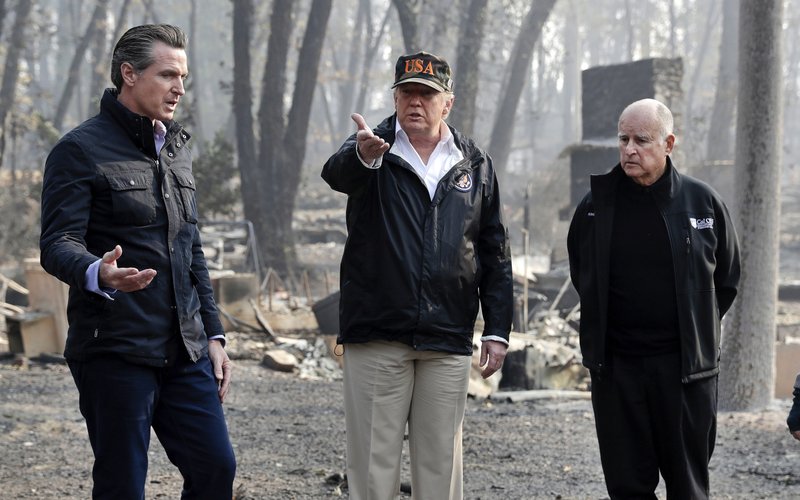WASHINGTON -- President Donald Trump's administration on Thursday broke off talks on vehicle mileage standards with California, increasing the chances of a court battle that threatens to unsettle the auto industry.
The White House, which has proposed freezing the standards, said it would now move unilaterally to finish its own mileage rule later this year "with the goal of promoting safer, cleaner, and more affordable vehicles."
"Despite the administration's best efforts to reach a common-sense solution, it is time to acknowledge that CARB [California Air Resources Board] has failed to put forward a productive alternative" since federal regulators in August proposed weakening mileage requirements adopted by President Barack Obama's administration, the White House said Thursday in a statement.
The administration's action challenges California's decades-old authority to set its own, tougher mileage standards. California has used a waiver that Congress granted it under the 1970s Clean Air Act to help deal with its smog. About a dozen states follow California's mileage standards; that group accounts for about one-third of U.S. auto sales.
Lawmakers and automakers had urged a settlement and warned that different standards could produce years of court battles and raise costs for automakers and consumers.
General Motors Co. and Ford Motor Co., the two largest U.S. automakers, said in separate statements that they were disappointed the talks broke down without an agreement.
Fuel-economy standards have significant influence over the mix of vehicles and engines that automakers sell, several years before new models arrive in showrooms. A court battle over mileage rules could upend technology development and investment plans for the U.S. while the other major auto markets of Europe and China press on with tougher requirements, said Brett Smith, director of propulsion technology at the nonprofit Center for Automotive Research.
"I hear companies say, 'Well we're going to go down this path regardless.' And they will, but they'll do it elsewhere, and they'll implement it elsewhere," said Smith.
Auto-parts suppliers, which develop much of the fuel-sipping technology that automakers use in their cars, will feel even more impact, said Alan Baum, an independent auto analyst in West Bloomfield, Mich. "If you're the supplier, you make an investment and if all of a sudden your customer says, 'never mind,' you've got an issue," he said.
Despite the notion that the White House is halting negotiations over the fuel standards, some officials in California said real talks never really began. They said sessions between the heads of the Environmental Protection Agency and the air resources board were not substantive and never progressed into the nitty-gritty of policy negotiations.
"The administration broke off communications before Christmas and never responded to our suggested areas of compromise -- or offered any compromise proposal at all," Stanley Young, a spokesman for the board, said in an email. "We concluded at that point that they were never serious about negotiating, and their public comments about California since then seem to underscore that point."
The dispute comes as Trump feuds with the Democrat-led state over his proposed U.S.-Mexico border wall and his threats to take back federal money from a high-speed rail project. California has taken a leading role in a 16-state lawsuit against Trump's declaration of a national emergency to get money for the wall after Congress refused to provide it.
"Another targeted attack on CA by the Trump administration," tweeted Gov. Gavin Newsom, a Democrat. "Clean air should be the most basic of human rights. This is a reckless political stunt that puts the health of MILLIONS of kids, families, and communities across America at risk."
The administration last year proposed freezing mileage standards for cars and light trucks after slightly tougher 2020 levels go into effect. Doing so would scrap a rule from Obama's administration that would have improved fuel efficiency in 2025 to a fleet average of 36 mpg on the road. The Obama standard would have raised fuel efficiency by 10 mpg over current levels.
Janet McCabe, an acting assistant administrator for air at the EPA under Obama, said California's years of technological and regulatory efforts to lower pollution have pushed the auto industry to make cleaner-burning vehicles.
The conservative American Energy Alliance asserted that the state's politicians long have taken a stand against "affordable, abundant energy, no matter the impact on California families."
The auto industry hasn't given up hope for an agreement on one national standard.
A major industry organization said automakers still support gradual increases in fuel economy that account for the shift from cars to SUVs and trucks.
"We encourage everyone to keep focusing on how we get there, because this is in the best interests of all parties, including consumers," the Alliance of Automobile Manufacturers said in a statement.
Information for this article was contributed by Ellen Knickmeyer, Tom Krisher and Kathleen Ronayne of The Associated Press; by Ryan Beene and Gabrielle Coppola of Bloomberg News; and by Steven Mufson and Brady Dennis of The Washington Post.
Business on 02/22/2019
